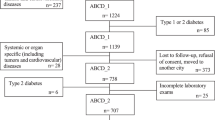Play all audios:

ABSTRACT Summary: In order to determine the relations between insulin and weight changes after diet, oral glucose tolerance tests (OGTT) were carried out before and after diet hi 37 obese
children aged from 6–16 years, whose weights corrected for height exceeded by at least 2 SD the weights of normal children of the same age and sex. Five children had not followed the diet
and increased during the period of observation both their initial weight excess (from +4.8 to +5.5 SD) and their hyperinsulinemia (total insulin of the OGTT: 359 μU/ml before, 443 μU/ml
after). In 32 children, diet resulted in significant weight loss (from +3.3 to +1.0 SD). Among these, two types of response to diet could be distinguished. 1) In 25 children, the initially
elevated insulin responses returned to normal or near normal values (mean sum of all five insulin values 282 μU/ml before, 144 μU/ml after diet), insulin and weight changes being positively
correlated. The younger children had better results than the older ones. 2) Seven children, although also having lost weight, showed an increase of insulin responses from initially normal to
secondarily elevated values (mean total insulin 133 μU/ml before, 260 μU/ml after diet). Age of onset, duration of obesity, and duration of diet were not related to either weight or insulin
changes. The results indicate that in the majority of cases hyperinsulinism observed in childhood obesity is reversible by diet in correlation with weight loss. Speculation: Dietetic
factors seem to play an important role in inducing reduction of hyperinsulinism and weight loss in obese children, vet they are not the only ones. Several not only physiologic but also
psychologic and environmental factors are involved hi the treatment of obesity and might be responsible for the paradoxical evolution of some subjects whose insulin responses were not
decreased but increased during diet. Further follow-up and new investigation of these patients will be necessary to reveal whether they constitute a group of different etiology and prognosis
in terms of obesity. SIMILAR CONTENT BEING VIEWED BY OTHERS FACTORS ASSOCIATED WITH BODY WEIGHT GAIN AND INSULIN-RESISTANCE: A LONGITUDINAL STUDY Article Open access 22 April 2024
ASSOCIATION BETWEEN SERUM LEPTIN CONCENTRATIONS AND HOMEOSTASIS MODEL ASSESSMENT-INSULIN RESISTANCE OF 2.5 AND HIGHER IN NORMAL WEIGHT JAPANESE WOMEN Article Open access 22 May 2023 MEASURED
VS ESTIMATED RESTING ENERGY EXPENDITURE IN CHILDREN AND ADOLESCENTS WITH OBESITY Article Open access 14 August 2023 ARTICLE PDF AUTHOR INFORMATION AUTHORS AND AFFILIATIONS * Groupe de
Recherche sur le Diabète et la Nutrition chez l'Enfant, INSERM U-83, I Deschamps, J F Desjeux, S Machinot, F Rolland & H Lestradet * Service de Pédiatrie du Profèsseur Lestradet,
Université Paris VII, Paris, France I Deschamps, J F Desjeux, S Machinot, F Rolland & H Lestradet Authors * I Deschamps View author publications You can also search for this author
inPubMed Google Scholar * J F Desjeux View author publications You can also search for this author inPubMed Google Scholar * S Machinot View author publications You can also search for this
author inPubMed Google Scholar * F Rolland View author publications You can also search for this author inPubMed Google Scholar * H Lestradet View author publications You can also search for
this author inPubMed Google Scholar RIGHTS AND PERMISSIONS Reprints and permissions ABOUT THIS ARTICLE CITE THIS ARTICLE Deschamps, I., Desjeux, J., Machinot, S. _et al._ Effects of Diet
and Weight Loss on Plasma Glucose, Insulin, and Free Fatty Acids in Obese Children. _Pediatr Res_ 12, 757–760 (1978). https://doi.org/10.1203/00006450-197807000-00003 Download citation *
Issue Date: 01 July 1978 * DOI: https://doi.org/10.1203/00006450-197807000-00003 SHARE THIS ARTICLE Anyone you share the following link with will be able to read this content: Get shareable
link Sorry, a shareable link is not currently available for this article. Copy to clipboard Provided by the Springer Nature SharedIt content-sharing initiative KEYWORDS * Diet * fatty acids
* insulin * obesity * plasma glucose
